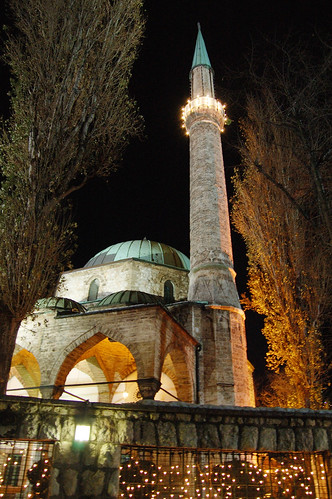By Claudia Mende
Islam has been practiced in Bosnia for centuries. Freelance writer Claudia Mende asks Armina Omerika, an expert in Islamic studies at the University of Erfurt in Germany, whether the Bosnian Islamic tradition could serve as a model for the integration of Muslims in other European societies.
How has Bosnian Islam come to terms with the non-Muslim Bosnian state?
Armina Omerika: This question arose for the first time in 1878, when Bosnia came under Austro-Hungarian rule. One could say that Bosnian Muslims have been living under “foreign rule” ever since. Even then, there were heated debates as to whether Muslims could live in a non-Islamic state. Reformers like Dzemaludin Causevic, leader of Bosnian Muslims from 1914 to 1930, were in favour of a modus vivendi [a temporary agreement between disputing parties allowing for peaceful coexistence until a formal settlement can be reached]. Naturally, this modus vivendi has changed through the years.
What issues were particularly controversial?
Omerika: There were fierce debates between Muslim intellectuals and scholars about the secularisation of education, the status of women in society and the reform of Islamic law. Since the Austro-Hungarian occupation, Islamic law has been restricted to family and inheritance laws.
One particularly controversial issue was the extent to which women could operate in public. The question of Islamic banks and interest rates was also discussed, as was the way in which the community should come to terms with non-Islamic administrative structures and systems of rule. Many areas of life were secularised – bit-by-bit. However, the impetus to reform Islamic law and to secularise society also came from within the Bosnian Muslim community, not from outside.

Havadže Duraka’s Mosque in Sarajevo [Photo by Steve Calcott]
In other words, nothing can be achieved by applying pressure from the outside alone?
Omerika: Nothing much can be achieved without an intra-Muslim debate. In Europe in particular, Muslim communities are very diverse. They frequently disagree with one another and are poorly linked. Dialogue within the Muslim community is the first prerequisite for solving integration problems in European societies.
What was the situation during the period of Communist rule?
Omerika: Secularisation in Bosnia peaked during the period of Communist rule [beginning in the 1940s]. Although the roots of secularisation reach back to Muslim groups and debates in the early 20th century, the Communists enforced secularisation from above and coupled it with repressive measures against the Muslim community. Secularisation was implemented in a way that is out of the question for contemporary democratic states.
Did this forced secularisation lead to a religious revival?
Omerika: From the mid-1960s onwards, there was a phase of liberalisation and a hint of religious freedom, which led to a religious revival. Semi-legal movements and informal networks that had continued to exist underground were now able to speak out in the Communist state.
Is there an overlap between Islam and Bosnian nationalism?
Omerika: Ever since the Bosnian War [from 1992 to 1995], the Muslim community has supported a form of political nationalism in which ethnic national identity is equated with religious and political identity. Accordingly, alliances are repeatedly formed between the Muslim community and the various Bosniak (i.e. Bosnian Muslim) parties in Bosnia and Herzegovina that have a nationalist outlook.
Muslim communities in Western Europe, on the other hand, are made up largely of Muslims who have migrated there since the 1950s. Since then, Muslim life of an unprecedented diversity has developed. This diversity is not only of an ethnic, but also of a theological nature. There are linguistic, ethnic and doctrinal barriers amongst the Muslims of Western Europe which make it impossible to transfer aspects of Bosnia’s Muslim community to other regions of Europe.
And what about the theological aspects? Could they act as a model?
Omerika: In Bosnia, the tradition of open Muslim discourse is as old as the Muslim community itself. While there are conservative currents, they are part of an ongoing debate.
A milestone in Bosnian Islam was the re-establishment of the Faculty of Islamic Studies in Sarajevo in 1977. Islamic scholars such as Enes Karic and Fikret Karcic, who work at Europe’s only Muslim faculty at a state university, have developed groundbreaking concepts for the integration of Islam into a secular state.
Is the status of Islam a topical issue in Bosnia?
Omerika: Mufti Mustafa Ceric is particularly controversial. Many accuse him of positioning himself as a political player and overstepping the bounds of his role as a religious leader. They also say that he is mixing Islam and politics and poses a threat to the secular character of the state.
In addition, Salafism [a conservative Sunni movement originating in Saudi Arabia] and its missionary efforts are a regular theme in the Bosnian press. In contrast, hardly anything is said about conservative Christians from the United States acting as missionaries to Muslim, Catholic and Orthodox youth. The same holds true for the close ties between the Serbian Orthodox Church and the state structures. The debate about Islam and its role in society has become a kind of ersatz discourse for debates about religion in general.
—
Claudia Mende is a freelance writer. Armina Omerika is Assistant Professor at the University of Erfurt, Germany. This abridged article is distributed by the Common Ground News Service (CGNews) with permission from Qantara.de. The full text can be found at www.qantara.de.
